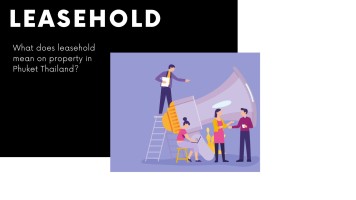What does a Leasehold mean in Thailand?

What does a Leasehold mean in Thailand?
Leasehold Meaning
A leasehold is an interest in property whereby the leaseholder does not actually own the property but is granted the right of "exclusive possession" and use of the property.
A long-term leasehold contract is not just a contractual agreement, it is also a registrable legal interest against the freehold title document. Once registered, the lease on Thailand real estate becomes a lien upon the title deed. As a legal interest, it also means the lease can be bought, sold, and transferred.
The right to possession and use is for a specified period of time in return for the payment of consideration and the terms are recorded in a "lease agreement" contract. On real estate in Thailand, it's possible to take a leasehold interest over any type of property such as land, apartments, condominiums, townhomes, or villas.
So what is a leasehold in Thailand? The current legal maximum period stipulated for a leasehold is 30 years in Thailand. This relatively short period specified by Thailand real-estate law for leasehold property has therefore led to the creation of contractual leasehold arrangements designed to "extend" the lease term. Land offices in Thailand refuse to register leases for more than 30 years, although they do allow private agreements to contain lease "renewals".
Consequently, great efforts have been made by developers and their lawyers to provide purchasers the opportunity to acquire longer leasehold periods.
If the leasehold relates to land, the agreement would generally be a Land Lease Agreement (LLA). If the leasehold concerns an apartment, the agreement would generally be an Apartment Lease Agreement (ALA).
Leasehold with Freehold Option
Leasehold Acess
Successful property investing also means that you make sure you have both physical and legal access to the land or property. A long-term leasehold contract should contain a clause that addresses access, also known as servitude. In the contract, it would look something like this: "The Developer shall provide irrevocable unencumbered and unobstructed access between the public road and the Plot under this Agreement and other common areas within the Project as appears in the Master Plan."
Leasehold Succession Clause
Be mindful that leases are personal in nature, which means a leasehold terminates upon the death of a lessee. On any Thailand real estate, it is very important to have a Succession Clause inserted into a long-term leasehold contract stipulating that the lessee's rights and obligations will be assigned to the lessee's beneficiary of choosing.
In Thailand, a foreign will & testament is acceptable in Thai courts. It will have to be translated into the Thai language first and then authorized by the Ministry of Foreign Affairs.
Leasehold Section 540
A hire of immovable property (land, house, apartment, or condominium) for residential purposes by a foreigner is governed by the Civil and Commercial Code. Foreigners are allowed to lease Thailand real estate in the same manner as Thai nationals.
According to Section 540 of the Civil and Commercial Code, at the end of the first 30-year term, the lease will expire unless both parties re-register the second 30-year term (supported by a contract). It is common practice in Thailand to grant 2 extensions of 30 years for a total of 90 years through a contract at the time of purchase.
90 Year Leasehold
What is the leasehold term in Thailand? When buying leasehold real estate in Thailand, it is common to come across the 30+30+30-year leasehold structure. In theory, this is a 90-year lease but purchasers must understand that only the first 30 years are legally registered and therefore guaranteed, while the two options to renew are contractual in nature.
It should be noted that leasehold renewals are not automatic and require paperwork at the land office at the end of each term to renew the lease. Without getting into complex legal terminology, the main point to understand is that the 30+30+30-year leasehold structure is not equivalent to a 90-year lease.
Leasehold Taxes
Most condominium investors with a hold time of fewer than 10 years will choose a leasehold structure over a foreign freehold structure due to the substantially lower tax rate of 1.1% at the time of sale.
Protect Yourself with a Solicitor
Engaging a property law firm for assistance with the purchase of Thailand real estate is highly recommended. We always suggest consulting a property law firm to establish which form of ownership is best suited for you. The minimal cost of legal counsel should not be viewed as an expense but as insurance.
We would be happy to answer your questions regarding leasehold on Phuket real estate and property ownership in Thailand.
Call us today at +66 93 606 0906 and we can explain in more detail the question, "What is a leasehold in Thailand?"

